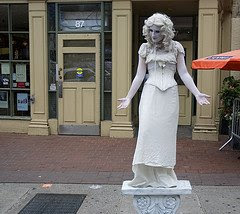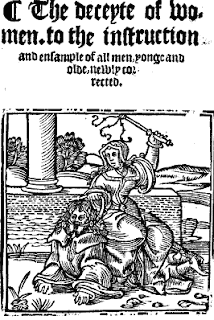Friday, January 30, 2009
Actions Speak Louder Than Words
I feel that if we must blame one of them for the demise of their marriage, we must also blame the other (based on Whatley's writings, anyways). Frankford seems to have failed in "the keeping of his authority" (Whatley), which Whatley actually names as a responsibility before "the using of his authority" (Whatley). By taking leave of his house and telling Wendoll that he was to act as master of the estate, he gave up some of that precious authority, which enabled this downward spiral to begin. As far as the woman's role according to Whatley goes, Anne doesn't seem to have done too well either. Whatley warns not to do a lot of things, especially not to be "passionate", which Anne obviously disobeyed in the play. She let her passions get in the way of her duties as a wife and mother.
In short I guess I think that everybody is to blame, and nobody is to blame. True, both Frankford and Anne faltered gravely. However, it is difficult to find fault in their actions as they are both products of a society that values appearances over true feelings.
The Ties That Bind... Or Don't.
It seems as if Heywood is attempting to stay in line with the Protestant ideals of marriage while gently calling some of its flaws to attention. He remains safely maintains adherence to the concept of the Protestant marriage by punishing Anne at the end of the play. However, by allowing Anne to fold so quickly to Windoll’s wooing, Heywood calls into question the effectiveness of such a marriage.
Heywood shows how the aristocratic view of marriage is little else than maintenance of high birth and wealth. Although these marriages are carefully planned, they lack the element of emotion and love. He counters this highborn idea of marriage by giving some insight into the lives of some of the servants. The servants are not bound by the rules of affection that plague the aristocracy and Heywood portrays them as being better for it. Although he calls into question the effectiveness of marriage, Heywood still maintains a chauvinistic view of women. Throughout the play the women are at the mercy of the whims of the men.
Had Whatley been asked why Frankford’s marriage failed, he may have found himself in an awkward position. He would most likely have the strong instinct to place the full blame on Anne but he would be forced to bring Frankford into the picture as well. Anne does not violate any of the rules set forth by Whatley defining the role of the wife (except, possibly, for being discontented). It is Frankford who seems to violate Whatley’s rules. By passing his authority to Wendoll, Frankford effectively surrendered that which made him the head of the relationship. Because it is simply the wife’s task to be submissive, among other things, she cannot be faulted for her actions within the parameters of Whatley’s logic. She was still remaining obedient to her husband’s authority even if Wendoll was misusing it.
To trust, or not to trust
Anne probably really was devastated when Frankford discovered her and Wendell in bed together, but so was Frankford. He says: "For I am most ashamed, and 'tis more hard for me to look upon thy gulity face than the sun's clear brow" (Scene 13, Lines 87-89). They are both human beings involved in a marriage, not a governmental run institution, as Whately seems to make marriage out to be.
Love and Marriage
Heywood’s play leads the reader to believe that bridegrooms of the play are foolish for following their hearts completely without using their dominating abilities. They are to be stern and strong, yet both characters don’t use their authority at all, causing both women to turn away from them. Heywood seems to be insinuating that a man must control his wife or else have the tables turned, with the wife calling the shots and making the choice of whether or not to be faithful. Both Frankford and Acton used love as the basis of their happiness in marriage, and this is something Whatley would not have wanted and goes against his teachings. Maybe they should have followed his advice.
--On Behalf of Kim
Obviously Opaque
Delegate Educate Discriminate Eviscerate
"Acton" Like a Fool (sorry)
Take Acton and Susan's eventual nuptials, for instance. The moment Acton sees Susan he immediately disregards his "male" role as authority figure, instead falling head over heels in love: "I am enchanted," he says, " all my spirits are fled, and with one glace my envious spleen struck dead. (7. 93-94)" Acton, despite all of his fiery fury just moments prior, now seems to embody more Whately's "wifely" role, "favoring all lowlinesse and quietnesse of affection."
Susan, likewise, at first adopts the "husband" role, rejecting Acton's affections with a stern "Acton! Oh God, that name I am born to curse...See, I spurn his gold. (9. 52-54)" At this point, of course, Susan does not suspect marriage as Acton's attention, but rather a more base deflowering. At this point as well, Whately would be shocked to even consider a marriage between such figures, a "deformed family" would surely result. That Sir Francis is so adamant about his love and intentions for Susan certainly calls into question Whately's views; Heywood is saying that, gender roles be damned, Francis will marry her. And yet, the second marriage is actually proposed, Susan's attitude changes: "I will yield to fate, and learn to love where I till now did hate. (15. 147-8)"
By the end of the play, Frankford and Anne, who initially seem to embody Whately's proscriptions, have fallen apart, while the horribly mismatched Sir Francis and Susan are (admittedly tenuously) engaged and determined to make their marriage work. Nonetheless, in order to marry, Francis and Anne are forced to adopt at least somewhat Whately's roles. Though Heywood does not believe that Whately's rules necessarily make for a good marriage, he believes that some semblance of them must exist for one to work.
And You Call this Marriage?
Furthermore, Frankford does not keep his place as head of the house. He creates a trap to ensnare the treachery of his wife, and in doing so, gives his command to Wendoll to take his place as the head of the household. Whatley says that this creates a “deformed family” (19). Heywood proves this to be true when he makes Frankford’s character create a semblance of what one could call the “Trojan Horse” effect when he sets a trap for his wife, finds that she does betray him, and then takes away her rights as a mother and wife. This deformity, as Whatley would call it, signifies that Heywood conveys the very essence of what a marriage (in theology) would be which is to say that the wife is supposed to be completely submissive in all things and that the husband should take the lead. When these things are nonexistent, the marriage becomes a tragedy.
Heywood Exposes the Flaws of Whately
This view of marriage corresponds with Whately’s marriage manual, which states that wives must “carry the stamp of fear upon them, and not be cutted, sharpe, sullen, passionate, teechie; but meeke, quiet, submissive” (38). This is clearly not the marriage based on companionship we think of today, but rather a marriage of ownership.
With standards like these, it’s only logical that a lonely aristocrat would look to an equal, another male aristocrat, for true companionship rather than his wife, a subordinate, who might as well be a ‘child or servant.’ And we all know how dull children and servants can be.
It is this imbalance in the relationship that causes Frankford to invite Wendoll into their home, which ultimately leads to dissolution of their marriage. In this way, Heywood subtly attacks Whately’s views on marriage, illustrating how a marriage based on possession and submission rather than companionship is mortally wounded from the start.
Thursday, January 29, 2009
Authority Rules
Blog 2: Love and Marriage?

In last week’s blog we discussed Galatea’s representation of love: at once an affliction and a force of radical liberation and possibility. As we move from a boy’s company’s command performance to domestic tragedy, and from the pseudo-classical dreamworld of the Lincolnshire coast to a less fanciful picture of private life, it's worth wondering what Heywood is telling us about the realities of love once the romance is over and marriage begins.

For this blog, we will be looking at William Whately’s treatise on marriage (1617) a typical example of the conduct literature (e.g.: marital advice manuals) from the early modern period.

The following excerpt presents advice to men on the duties of husbands:
“Now for the husbands speciall duties, he may fitly be referred to these two heads: The keeping of his authority, and the using of it. First, he must keep his authority, and maintaine himselfe in that place, wherein his Maker hath set him. Nature hath framed the lineaments of his body to superiority, & set the print of government in his face, which is more sterne, lesse delicate then the womans. He must not suffer this order of nature to be inverted. The Lord in his Word calls him the head; hee must not stand lower than the shoulders; if he doe, that is a deformed family.” (18-19)
In this next excerpt Whately addresses women and their role as wives:
“First, in speeches and gestures unto him. These must carry the stamp of fear upon them, and not be cutted, sharpe, sullen, passionate, teechie; but meeke, quiet, submissive, which may shew that she considers who herselfe is, to whom she speaks. The wives tongue towards her husband must bee neither keene, not loose, her countenance neither swelling nor deriding: her behaviour not flinging, not puffing, not discontented, but favouring of all lowlinesse and quietnesse of affection. Looke what kinde of words or behaviour thou wouldst dislike from thy servant or childe, those must thou not give to thine husbande: for thou art equally commanded to be subject.” (38)
Larger excerpts from Whately's text are available through the Folger Shakespeare Library site.
Questions to consider: is Heywood refuting or upholding the Protestant theology of marriage? How do his representations of the serving class, the aristocracy, male-male friendship, and women, complicate a homiletic reading of his play?

